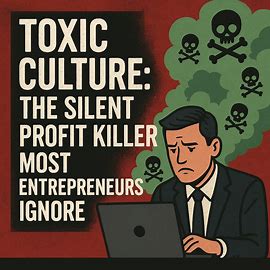TOXIC CULTURE: THE SILENT PROFIT KILLER MOST ENTREPRENEURS IGNORE
Blog explains why is it important to work on company culture
savita morale
10/5/20252 min read


TOXIC CULTURE: THE SILENT PROFIT KILLER MOST ENTREPRENEURS IGNORE
As entrepreneurs, we obsess over revenue, margins, and market share — but rarely over the invisible cost of culture.
A toxic workplace doesn’t just damage morale; it silently bleeds productivity, innovation, and brand reputation.
Here’s what really creates toxicity — and why smart founders must spot it early
1. Ego Over Empathy
Entrepreneurs often start with vision, but as success grows, ego quietly takes the driver’s seat.
When decisions become about power, not purpose — people stop contributing and start complying.
The cost? Innovation dies.
2. Poor Communication at the Top
Many business owners underestimate how fast unclear communication turns into chaos.
When employees get mixed messages or half-truths, rumors fill the gap — and trust collapses.
In business, silence costs more than salaries.
3. Fear-Driven Management
Fear may get results short-term, but it kills creativity long-term.
A fearful team won’t make decisions, won’t experiment, and won’t stay loyal.
If your team says “yes” to everything, it’s time to worry — they’ve stopped thinking.
4. Unfair Systems and Favouritism
When rewards are based on proximity, not performance, top talent leaves silently.
Fair systems attract loyalty; bias invites politics.
No brand survives internal politics for long.
5. No Boundaries, Only Burnout
Many founders mistake busyness for commitment.
But when people are stretched 24/7, exhaustion replaces engagement.
A tired mind won’t innovate — it will simply obey.
6. Avoiding Difficult Conversations
Toxicity thrives where leaders avoid accountability.
Confronting underperformance or bad behavior isn’t harsh — it’s healthy.
What you don’t address in your culture becomes the culture.
7. Vision Without Emotional Intelligence
You can’t build a healthy company with just a business plan — it needs emotional architecture.
When employees feel disconnected from the “why,” they stop caring about the “what.”
And that’s when performance becomes transactional, not transformational.
The Entrepreneur’s Takeaway
Culture isn’t a “soft” subject — it’s a strategic business lever.
A toxic environment might still deliver short-term profits, but it will never build long-term equity.
Strong companies are built on clarity, consistency, and character — not control.
Because at the end of the day, culture compounds faster than capital.
LABDHI HR
LABDHI HR STRATEGIES AND SERVICES
consultant@labdhihr.com
+91 8424815548
© 2024. All rights reserved.
Registered Office Address:
We Work, Oberoi Commerce II , Goregaon East, Mumbai,Maharashtra,India-400063
